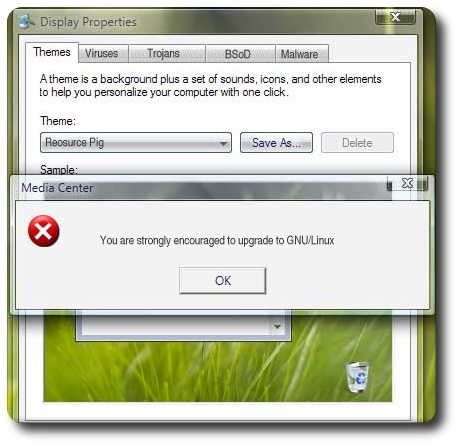The powers and savour of GNU/Linux have taken the attention of Oracle’s taste buds. Anything that reduces margins seems to make the founder, Larry Ellison, feel elated. And he’s no exception these days. Some months ago I heard the following joke (paraphrased below):
Q: What is the difference between God and Larry Ellison?
A: God does not think he is Larry Ellison.
Oracle is no longer waiting for a days of free beer (let alone Freedom, as in Free and free UNIX). Oracle reaps the crops which others have previously sown, throughout the early days of Linux. Oracle programmers do not share much of their work, despite their new Open Source strategy. Meanwhile, OSDL is being snubbed too, according to a recent interview. So what gives? Will Sun Microsystems go down a similar route with Java?
I sometimes think that Oracle executive need to sober up their mind (preferably with some rum) and give something in return. Linux could truly benefit from budgets as large as Oracle’s — budgets that expand owing to the competitive advantage one gets with Linux. Seeing the abuse they currently direct at Red Hat leaves nobody with impeccably-neutral thoughts, sentiments and Oracle affinity. The ethical issues that are tied to forking of Red Hat Enterprise Desktop/Server, as well as the inability to snatch JBoss for middleware, has left Oracle bitter. But it’s more akin to snobbery, as well as neglect of the roots that got Oracle where it is today (Oracle was among the earliest large adopters of Linux).

RedHat Linux
Will Oracle ever befriend Linux and actually prove that something can be given in return? At present, Oracle competes with and destroys some of the business that MySQL, Firebird, and PostgreSQL have conquered with Linux and pure Open Source software. This lack of moral values makes the mind boggle. Reciprocal benefit is just a belt-and-braces exercise given that Linux is out there begging for mere donations. What about assisting the giant whose shoulders you now stand on? Nobody can issue a cease-and-desist on the use of Linux and, in fact, with contributions to the kernel and even vocal appraisal alone, this can be seen as a form of advertising — a reciprocity.
I continue to perceive Oracle as somewhat of a Linux and Open Source parasite. Sometimes, more damage to reputation is done rather than the very contrary. Every once in a while somebody needs to crack that whip and knock some sense into those who only use Linux, accumulating enormous wealth and refuse to return anything, even when gently asked. Although there is no obligation (this is a clear point that frequently recurs in such discussions), there should be some sense of responsibility. You give and you get. FLOSS is community based, so the development of ‘lamer’ habits is dangerous. Let us all work together for the betterment of Linux.
Related item: Open Source and Paracites
From the press: Oracle #1 on Linux With More Than 80% Market Share
Oracle’s Linux commitment began in 1998 with the first commercial database on Linux. Today, only Oracle provides support for the complete software stack on Linux with applications, middleware, database and the operating system, including Red Hat, Novell/SUSE and Asianux. All Oracle products run on Linux, and Oracle Database on Linux meets the EAL4 Common Criteria…
 CCORDING to various sources (including a seminal report from TechCrunch), Digg seeks to be acquired. The reactions are, as expected, largely rants that express dissatisfaction, particularly within the Digg community. I spotted this one comment the other day.
CCORDING to various sources (including a seminal report from TechCrunch), Digg seeks to be acquired. The reactions are, as expected, largely rants that express dissatisfaction, particularly within the Digg community. I spotted this one comment the other day.





 Filed under:
Filed under: 

 T is pretty much
T is pretty much  I am very much pleased to have gotten an opportunity to work with a group of talented people. Up, close and person, figures whom you were taught to dislike (principally Calacanis) are quite friendly and kind. They are not the devils that you were led to believe they are. What bothers me most are some recent accusations that come from conspiracy theorists. Some would argue that Netscape is trying to
I am very much pleased to have gotten an opportunity to work with a group of talented people. Up, close and person, figures whom you were taught to dislike (principally Calacanis) are quite friendly and kind. They are not the devils that you were led to believe they are. What bothers me most are some recent accusations that come from conspiracy theorists. Some would argue that Netscape is trying to 
 ARELY should politicians get involved in the software industry. Ever. As a matter of fact, they generally fear that unknown as seldom will they be familiar with the latest technology. Everyone steers away from anything which can expose ignorance and lead to an embarrassment, at peer or public level.
ARELY should politicians get involved in the software industry. Ever. As a matter of fact, they generally fear that unknown as seldom will they be familiar with the latest technology. Everyone steers away from anything which can expose ignorance and lead to an embarrassment, at peer or public level.

 ICROSOFT have managed, over the course of many years, to sustain over 90% market share on the desktop. It is a figure that is easy to defend and argue in favour of given an unknown and uncountable number of Linux installations. Dropping below 90%, unlike what many would state or even insist on, is harder than getting there, but much is about momentum, as well as ethics. Allow me to explain why, primarily using an analogy.
ICROSOFT have managed, over the course of many years, to sustain over 90% market share on the desktop. It is a figure that is easy to defend and argue in favour of given an unknown and uncountable number of Linux installations. Dropping below 90%, unlike what many would state or even insist on, is harder than getting there, but much is about momentum, as well as ethics. Allow me to explain why, primarily using an analogy.